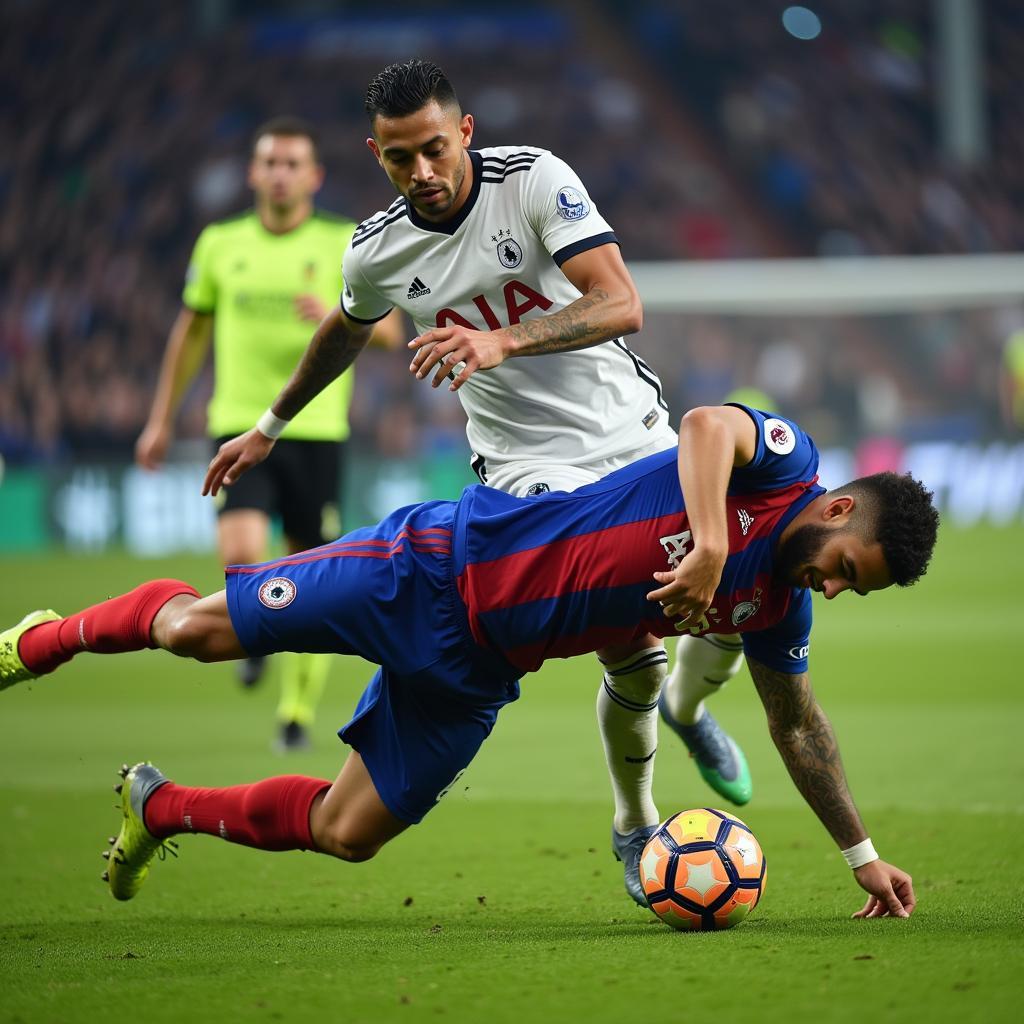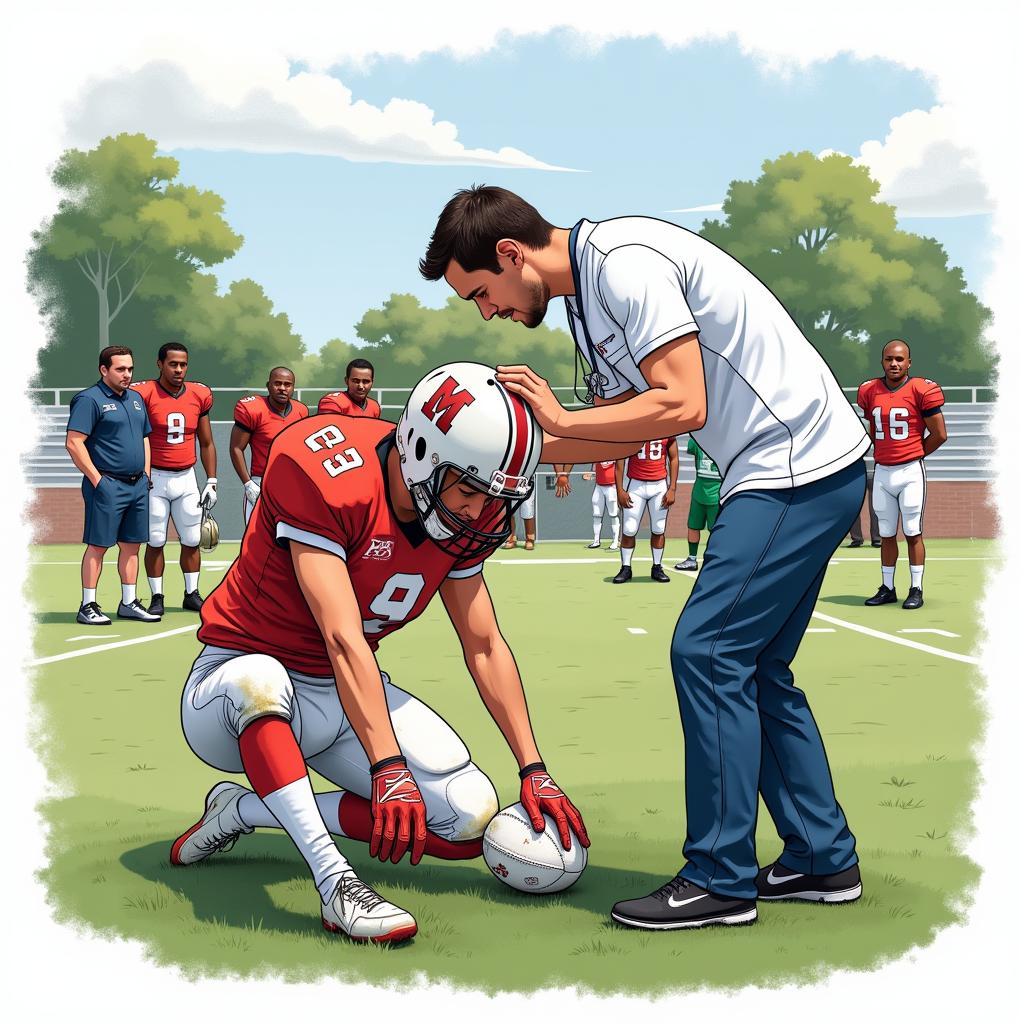Player Falls Head First: Understanding the Risks and Consequences
January 26, 2025Player falls head first. It’s a chilling sight on any football pitch. Whether it’s a mistimed header, an awkward fall, or a collision with another player, the potential for serious injury is immense. This article delves into the dangers of head-first falls in football, explores preventative measures, and discusses the importance of immediate and proper care.
The Dangers of a Head-First Fall in Football
Head-first falls are particularly dangerous due to the vulnerability of the head and neck. The impact can result in a range of injuries, from mild concussions to severe traumatic brain injuries. Even seemingly minor impacts can have long-term consequences, impacting cognitive function and overall health. The force of the fall can also cause spinal cord injuries, which can lead to paralysis or other serious complications.
- Concussions: A concussion is a type of traumatic brain injury caused by a bump, blow, or jolt to the head or body. Symptoms can range from headaches and dizziness to confusion and memory loss.
- Skull Fractures: A skull fracture is a break in the cranial bones. These fractures can be linear (a simple crack) or depressed (where the bone is pushed inward).
- Cervical Spine Injuries: The cervical spine, located in the neck, is particularly susceptible to injury in head-first falls. Damage to the spinal cord can result in paralysis or other neurological deficits.
 Player Falls Head First in Football Match – Serious Injury Risk
Player Falls Head First in Football Match – Serious Injury Risk
Preventing Head-First Falls: Proactive Measures for Player Safety
While the unpredictable nature of football makes eliminating all risks impossible, there are proactive steps that can be taken to minimize the occurrence of head-first falls. Proper training and technique are essential. Players should be taught how to fall safely, using their arms and shoulders to absorb the impact rather than their head. Coaches should emphasize the importance of good sportsmanship and avoiding reckless tackles or challenges that could lead to dangerous falls.
- Proper Heading Technique: Learning the correct heading technique can reduce the risk of head and neck injuries.
- Strength and Conditioning: Strong neck and shoulder muscles can help protect the head and neck during a fall.
- Awareness on the Pitch: Being aware of your surroundings and the position of other players can help prevent collisions.
Immediate Care and Long-Term Management of Head Injuries
Immediate action is crucial following a head-first fall. The player should be assessed by a medical professional immediately, even if they appear to be uninjured. Any signs of concussion, such as confusion, dizziness, or memory loss, warrant immediate removal from the game and further evaluation. Proper diagnosis and management are essential to ensure the player’s long-term health and well-being. Returning to play too soon can increase the risk of further injury and long-term complications.
- Assessment by Medical Personnel: A qualified medical professional should assess any player who has fallen head first.
- Removal from Play: Players suspected of having a concussion should be removed from play immediately.
- Follow-up Care: Proper follow-up care and rehabilitation are essential for a full recovery.
 Medical Professional Assessing Injured Football Player After Head-First Fall
Medical Professional Assessing Injured Football Player After Head-First Fall
Conclusion
Player falls head first—it’s a scenario we all hope to avoid. By understanding the risks, implementing preventative measures, and ensuring appropriate care, we can work towards making football a safer sport for everyone. Recognizing the seriousness of head-first falls and taking the necessary precautions is crucial for protecting players’ health and well-being.
FAQ
- What are the most common injuries from a head-first fall?
- How can I recognize the signs of a concussion?
- When can a player return to play after a head injury?
- What is the role of protective gear in preventing head injuries?
- What are the long-term consequences of repeated head injuries?
- How can coaches promote safe play and prevent head injuries?
- What are the latest advancements in head injury treatment and prevention?
Need support? Contact us 24/7: Phone: 0396443476, Email: [email protected], or visit us at 23 Tháng 3, Đắk Nia, Gia Nghĩa, Đắk Nông, Việt Nam.